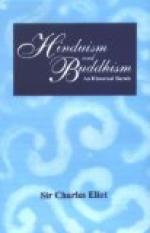I have neither space nor competence to discuss the date of the Hermetic writings, but it is of importance for the question which we are considering. They contain addresses to the deity like I am Thou and Thou art I [Greek: ego eimi su kai su ego]. If such words could be used in Egypt several centuries before Christ, the probability of Indian influence seems to me strong, for they would not grow naturally out of Egyptian or Hellenistic religion. Five hundred years later they would be less remarkable. Whatever may be the date of the Hermetic literature, it is certain that the Book of Wisdom and the writings of Philo are pre-Christian and show a mixture of ideas drawn from many sources, Jewish, Neoplatonic and Neopythagorean. If these hospitable systems made the acquaintance of Indian philosophy, we may be sure that they gave it an unprejudiced and even friendly hearing. In the centuries just before the Christian era Egypt was a centre of growth for personal and private religious ideas,[1109] hardly possessing sufficient organization to form what we call a religion, yet still, inasmuch as they aspired to teach individual souls right conduct as well as true knowledge, implicitly containing the same scheme of teaching as the Buddhist and Christian Churches. But it is characteristic of all this movement that it never attempted to form a national or universal religion and remained in all its manifestations individual and personal, connected neither with the secular government nor with any national cultus. Among these religious ideas were monotheism mingled with pantheism to the extent of saying that God is all and all is one: the idea of the Logos or Divine Wisdom, which ultimately assumes the form that the Word is an emanation or Son of God; asceticism, or at least the desire to free the soul from the bondage of the senses; metempsychosis and the doctrine of conversion or the new birth of the soul, which fits in well with metempsychosis, though it frequently exists apart from it. I doubt if there is sufficient reason for attributing the doctrine of the Logos[1110] to India, but it is possible that asceticism and the belief in metempsychosis received their first impulse thence. They appear late and, like the phraseology of the Hermetic books, they do not grow naturally out of antecedent ideas and practices in Egypt and Palestine. The life followed by such communities as the Therapeutae and Essenes is just such as might have been evolved by seekers after truth who were trying to put into practice in another country the religious ideals of India. There are differences: for instance these communities laboured with their hands and observed the seventh day, but their main ideas, retirement from the world and suppression of the passions, are those of Indian monks and foreign to Egyptian and Jewish thought.




